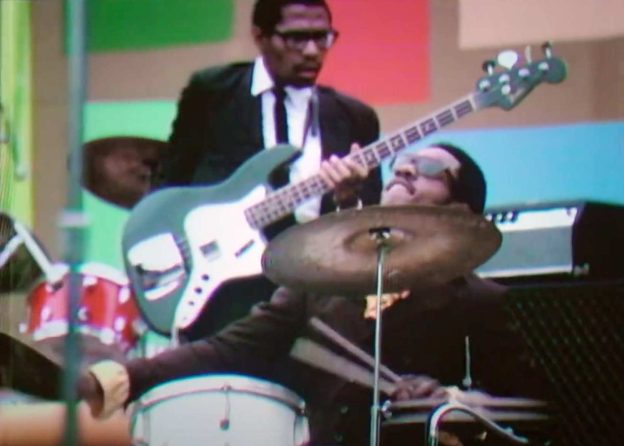So I was watching a news item about the new movie Summer of Soul and… Wait a minute, is that Andrew White?
Indeed, there he was, standing behind Stevie Wonder (who’s playing drums), electric bass in hand. Wow. I knew from talking to Andrew and Hershel Dwellingham that White had played bass in Wonder’s band, but I never expected to see footage of him doing so.
At this point you may be wondering, what is Summer of Soul ? Summer of Soul … (Or When the Revolution Could Not Be Televised) is a two-hour documentary based on the 1969 Harlem Cultural Festival, a six-week concert series held at Mount Morris Park (now Marcus Garvey Park) in Harlem, New York. It was free, attracted over 300,000 spectators, and featured a remarkable cast of performers: 19-year-old Stevie Wonder, the 5th Dimension, B. B. King, Gladys Knight & the Pips, Sly and the Family Stone, Nina Simone, the Chambers Brothers, the Staple Singers, Mahalia Jackson… you get the idea.
Television producer Hal Tulchin videotaped all six concerts in the belief that he would eventually be able to sell the material or develop his own documentary out of it. Instead, the tapes sat in his basement for decades before eventually forming the basis for Summer of Love, which also examines the cultural environment in which the concerts were held. It was released in theaters this past summer and is currently streaming on Hulu. After seeing the CBS news piece, I sat down and watched the movie itself, and it’s great. The footage is remarkable. It’s fair to say that at points it caused tears to well up in my eyes. I highly recommend you seek it out.
So back to Andrew White. If his name doesn’t ring any bells, check the liner notes for Sweetnighter. White was recruited for that album specifically to provide a Motown feel on electric bass; he can be heard on “Boogie Woogie Waltz,” “125th Street Congress,” and “Non-Stop Home.” Joe and Wayne previously knew White as a reed player—he played English horn on I Sing the Body Electric—but when Zawinul saw the 5th Dimension on television one night, he recognized White playing electric bass. “Joe was looking at the television and saw me doing that shit, and we knew each other,” White recalled to me. “He said, ‘Wait a minute! I know Andrew from the JFK Quintet and ‘Ball and Art Blakey.’ So he called Wayne and said, ‘Wayne, call Andrew to see if he’ll come over here and make this record with us.'”
In addition to White’s playing, Joe was taken by his stage mannerisms—what Andrew called his eccentric dancing. “I was doing that while I was playing,” White said. “And Joe had never seen nothing like that because he had never been to any Motown shows and seen any of those bass players or musicians who just had their own kind of thing. Actually, what it is is choreography. And because it’s choreographed in such a way in music, you are distracted by the musicality of what’s going on and you don’t know what you are looking at.”
Before the 5th Dimension, White played bass in Stevie Wonder’s band. “Stevie Wonder used to tell people from the stage, ‘Y’all lookin’ at Andrew’s pants? Is that whatcha all laughing at out there? You lookin’ at Andrew’s pants?’ And the people starting laughing. And Stevie’d say, ‘Well, Andrew said he’s going to dance for you.’ And here I am, standing up on stage next to Stevie Wonder, dancing and playing.”
White is one of a number of Weather Report—related musicians who appear in Summer of Soul. More prominent is Greg Errico, Sly and the Family Stone’s original drummer, and Weather Report’s drummer for the second half of 1973. Not only do we see Errico perform with Sly and the Family Stone, he is also interviewed for the documentary.
Other musicians who appear in Summer of Soul that have a Weather Report connection:
• Ray Barretto, who fronted his own band in 1969. Barretto played on the first album Zawinul made under his own name (To You with Love, recorded in 1959), and also makes an appearance on Mysterious Traveller‘s “Cucumber Slumber.”
• Don Alias, who is seen playing drums in Nina Simone’s band. He played on Weather Report’s first album as well as Black Market‘s title track and “Barbary Coast.”
• B. B. King. He doesn’t have a direct connection to Weather Report, but King did headline a couple of concerts in 1972 and 1973 in which Weather Report was also on the bill. Alex Acuña told me that on the day Joe came to Las Vegas to meet him in 1975, they went to see Bill Cosby and B. B. King perform at the Hilton and chatted backstage. When they left, Joe said, “I would love to play with B. B. King one day.”
• Herbie Mann. The Harlem Cultural Festival took place in the summer of 1969, just before Miroslav Vitous joined Mann’s band.
• Sonny Sharrock. Sharrock played with Miroslav in Herbie Mann’s band, and also on Wayne’s 1969 album Super Nova.
• Hugh Masekela. Before joining Weather Report, Omar Hakim and Victor Bailey played some gigs with Masekela. During the sound checks Omar and Victor noticed that they had a special connection, and Hakim subsequently recommended Bailey to Joe and Wayne.
Obviously most of these are trivialities when it comes to the overall scope of Summer of Soul, but this is a Weather Report website and sometimes we get into the weeds! In any event, see Summer of Soul. You won’t regret it.


















